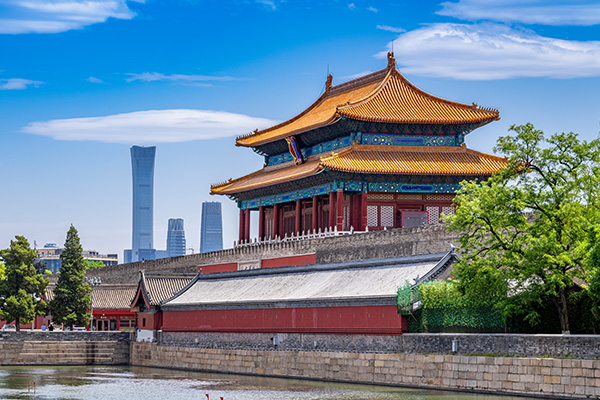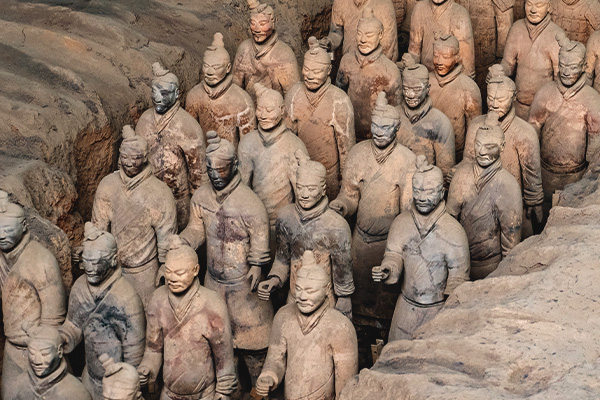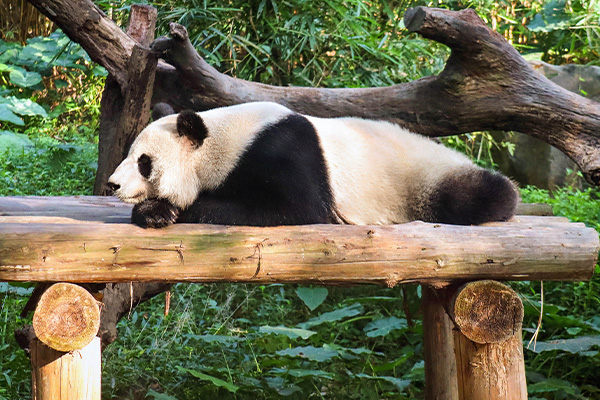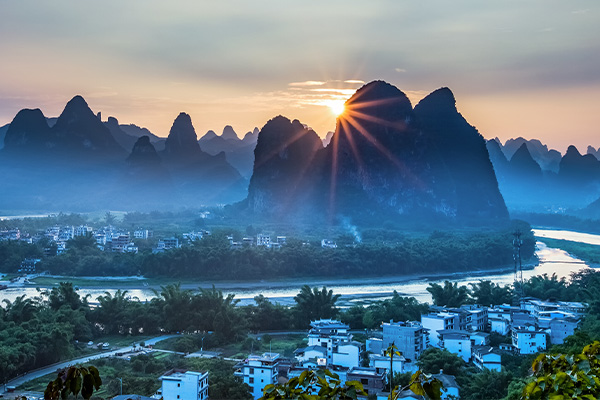China, an East Asian country, offers globetrotters an unmatched experience of the best of both worlds — ancient heritage and modern marvels. From the Great Wall of China to the bustling metropolises, a vacation in China gives you the best sides of the two worlds. That's not all. China is beyond ancient heritage and skyscrapers. There are serene landscapes and rugged mountains, which are captivating and awe-inspiring. Plus, the pristine beaches make you feel relaxed and happy. If you want to enjoy the best of both worlds, China is the destination you must visit.
When China is mentioned, the first thing that comes to mind is its vibrant ancient culture. There are only a few countries with such rich cultural and civilizational history. The Great Wall of China, an architectural marvel spread across thousands of kilometres, reflects China's ancient heritage. When in China, you must visit this monumental architectural marvel, perhaps one of the most iconic man-made structures in the world. The Terra Cotta Warriors is another architectural wonder, which is an underground tomb filled with 8,000 statues of ancient Chinese warriors dating back to 221 B.C. Apart from these, China is home to stunning Buddhist monasteries and temples. In short, China is a treasure trove of ancient culture.
Why Travel to China
Why Choose Us
- Local Chinese Company
- Deep knowledge of China's culture and tourism resources.
- 1-on-1 Travel Consultants
- Dedicated travel advisors tailor your journey to perfection.
- 11 Years of Experience
- Over 200,000+ Travelers in customizing travel in China and globally
Top Places to Visit in China

Beijing, located on the North China Plain, is the capital of the People’s Republic of China and serves as the nation's political, cultural, international exchange, and technological innovation center. With over 3,000 years of history as a city and more than 800 years as a capital, Beijing is one of the world’s most ancient and historically significant cities. Beijing is renowned for its magnificent historical landmarks and cultural symbols. World Heritage Sites such as the Forbidden City, the Great Wall, the Temple of Heaven, and the Summer Palace showcase China’s glorious history and exquisite architectural achievements. As China’s cultural heart, Beijing blends tradition with modernity, featuring the charm of old hutong neighborhoods alongside skyscrapers and a cosmopolitan urban vibe. Moreover, Beijing is a hub of Chinese cuisine, attracting visitors with its distinctive flavors. Signature dishes like Peking duck, zhajiang noodles, and fermented mung bean juice are iconic highlights. In recent years, Beijing has promoted green development and smart city initiatives, hosting major international events such as the 2008 Summer Olympics and the 2022 Winter Olympics, further cementing its global stature.
View More
Xi'an, the capital of Shaanxi Province, is one of China’s historical and cultural cities with a history spanning over 3,000 years. It is one of the Four Great Ancient Capitals of China and served as the starting point of the Silk Road. Xi'an was the capital for several important dynasties in Chinese history, particularly during the Qin and Tang Dynasties. As one of the cradles of Chinese civilization, Xi'an is home to many UNESCO World Heritage sites and historical landmarks. The most famous attraction in Xi'an is the Terracotta Army, a wonder of the ancient world and a major draw for tourists. Other historical landmarks such as the Big Wild Goose Pagoda, Small Wild Goose Pagoda, Bell Tower, and Drum Tower also stand as symbols of the city’s deep historical roots. Xi'an's ancient city wall is one of the best-preserved ancient city walls in China. Visitors can walk or bike along the wall and enjoy a panoramic view of the city’s ancient architecture. The Muslim Quarter in Xi'an is another unique spot where visitors can taste local snacks such as Roujiamo (Chinese hamburger), Liangpi (cold noodles), and Yangrou Paomou (lamb soup with bread). In addition, Xi'an is a city rich in cultural heritage. The city has a long tradition in arts, particularly in calligraphy, painting, and music. Xi'an is also a hub for education and research, with many prestigious universities and research institutions located here. Overall, Xi'an is a city with a profound historical charm, blending ancient cultural heritage with modern city life. It is a must-visit destination for anyone interested in China’s rich history and vibrant culture.
View More
Chengdu, located in southwestern China, is the capital of Sichuan Province and is renowned for its rich history and cultural heritage. With a history of over 3,000 years, Chengdu is one of China’s ancient capitals, often called the “Land of Abundance” due to its mild climate, fertile land, and leisurely lifestyle. The city is globally famous for its Giant Panda Breeding Research Base, an essential center for observing and protecting this endangered species. Chengdu is also the birthplace of Sichuan cuisine, known for its bold, spicy flavors. Signature dishes like hotpot, dan dan noodles, and Kung Pao chicken attract food enthusiasts from all over the world. Beyond food and culture, Chengdu boasts abundant natural and historical landmarks, such as Dujiangyan Irrigation System, Mount Qingcheng, and Wuhou Shrine. In recent years, Chengdu has rapidly developed into an international modern city while retaining its unique traditional charm. Recognized by UNESCO as a “City of Gastronomy,” Chengdu continues to shine on the global stage.
View More
Guilin, located in the northeastern part of Guangxi Zhuang Autonomous Region in China, is renowned for its unique karst landscapes and is often praised as having “the best scenery under heaven.” Guilin's picturesque natural beauty includes majestic peaks, the winding Li River, and enchanting cave formations. The Li River is the heart of Guilin, offering boat cruises that reveal stunning scenery such as Elephant Trunk Hill and the Reflection of Yellow Cloth. In addition to its breathtaking landscapes, Guilin boasts a rich history and cultural heritage. Since the Qin Dynasty, it has been a key transportation hub and cultural center. Historical landmarks like the Ancient South Gate and Jingjiang Princes’ City stand as witnesses to its past. The local cuisine, such as Guilin rice noodles and horse meat rice noodles, offers a unique taste of the region. Today, Guilin is a premier tourist destination in China, attracting numerous domestic and international visitors each year. Its harmonious blend of pristine natural environments, modern urban facilities, and traditional culture makes it an ideal travel destination.
View More
China Travel FAQ's
- ls it safe to visit China?
China is visited by travelers from all over the world and is generally a safe country to travel to as long as you know where you’re going, stay alert and obey local laws.
That said, China’s government does keep quite a tight lid on websites, news coverage and other foreign influences, and internet censorship and public surveillance are common. Demonstrations and protests are prohibited in public places in China, and if you find yourself in one, or you take a photo or video of the event, this could land you in trouble. - ls it a common practice to give tips inChina?
Tipping isn’t expected in mainland China and can even be considered rude in some situations. However, it’s becoming more common for travelers to give a small tip to hospitality staff in tourist areas. Tipping culture differs in Hong Kong and higher-end or Western-style restaurants in major cities like Beijing and Hong Kong where taxi drivers, restaurants and service staff will generally expect a tip.
- ls English widely used in China?
The official language of China is Mandarin. Despite English being taught in Chinese schools, it isn't commonly spoken by Chinese people in daily life. How ever you should have no problems at airports. high-end hotels, restaurants or large shops, where the staff can generally communicate with you in English, Besides, your professional English-speaking private guides will accompany you through out the whole journey in China, so just relax and enjoy your time.
- Can I use my cell phone in China?
Cell phone coverage is generally excellent in China's cities, and still very good in remote and rural areas.
If you have an unlocked phone, buying a local SIM on arrival is probably the cheapest and most reliable option to stay connected.
If you wish to use global roaming, be sure to contact your service provider to understand how much this will cost, as it's often very expensive. - What is internet access like in China?
Internet access is generally good in hotels and tourist areas, but it's limited in more remote areas. Some fast-food chains, restaurants and cafes have free wi-fi available, but may require a Chinese phone number to receive the login code. The login prompts may also be in Chinese.
Chinese governments and authorities keep strong controls over internet access and many Western websites, including social media and news outlets, are censored. Sites and apps including Facebook, Twitter, Instagram, Google products (YouTube, Maps, Gmail, Drive), WhatsApp, Snapchat and Dropbox, as well as many international news outlets, will not work.
You may wish to download the WeChat app during your visit, which is the country’s most popular communication app. It’s kind of like WhatsApp crossed with Facebook.
For many travelers, a Virtual Private Network (VPN) is used to limit this censorship. If you’re insistent on using certain websites abroad, look into purchasing a reputable VPN – keep in mind most of the free ones, and some of the paid VPNs, won't work.
With all this in mind, you’ve got the opportunity to switch off and enjoy the sights – that’s one way of looking at it!



